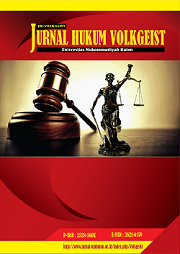Constitutional Implications of KPK Leadership Term Changes: Analysis of MK Decision No. 112/PUU-XX/2022 and Ruling Inconsistencies
DOI:
https://doi.org/10.35326/volkgeist.v8i1.4652Keywords:
Constitutional Court Decision,, KPK, Term ExtensionAbstract
Constitutional Court Decision No. 112/PUU-XX/2022, issued on May 25, 2023, underwent an amendment involving an analysis of Article 29 letter e and Article 34 in Law No. 19 of 2019 concerning the Corruption Eradication Commission (UU KPK) in conjunction with Law No. 30 of 2002. This decision is deemed inconsistent with constitutional principles and has the potential to impact anti-corruption efforts in Indonesia. The amendment provides a comprehensive analysis of the effects of the change in the term of office of the KPK leadership on the stability and performance of the institution, as well as its implications for anti-corruption efforts in Indonesia. The research methodology employed is normative juridical legal research with qualitative analysis of the Constitutional Court Decision and relevant legislation. This study aims to delve into the impact of the change in the term of office of the Chairman of the Corruption Eradication Commission (KPK) through Constitutional Court Decision No. 112/PUU-XX/2022. The research findings indicate significant changes in Article 29 letter e and Article 34 of Law No. 19 of 2019 concerning the Corruption Eradication Commission (KPK). Inconsistencies are observed in the application of the open legal policy concept by the Constitutional Court, particularly regarding the assessment of numerical values in previous rulings. Additionally, the study highlights errors in applying the non-retroactive principle concerning the changes in the term of office for KPK leaders, leading to controversy over the retroactive aspect of legal amendments.
Downloads
References
Ajie, R. (2016). Batasan Pilihan Kebijakan Pembentuk Undang-Undang (Open Legal Policy) Dalam Pembentukan Peraturan Perundang-Undangan Berdasarkan Tafsir Putusan Mahkamah Konstitusi. Legislasi Indonesia, 13(02), 111–120.
Barak, A. (2009). The judge in a democracy. The Judge in a Democracy. https://doi.org/10.5860/choice.44-2338
Dramanda, W. (2016). Menggagas Penerapan Judicial Restraint Di Mahkamah Konstitusi. Jurnal Konstitusi, 11(4), 617. https://doi.org/10.31078/jk1141
Fachruddin, I. (2004). Pengawasan peradilan administrasi terhadap tindakan pemerintah. Alumni.
FAHARUDIN, F. (2017). Prinsip Checks And Balances Ditinjau dari Sisi dan Praktik. Jurnal Hukum Volkgeist, 1(2), 115–128.
Foekh, R. M. E. (n.d.). Anomali Asas Non Retroaktif dalam Putusan MK Perpanjangan Jabatan Pimpinan KPK. HUKUM ONLINE.
Habibi, M. (2020). Independensi Kewenangan Komisi Pemberantasan Korupsi Pasca Perubahan Undang-Undang Komisi Pemberantasan Korupsi. Cepalo, 4(1), 41–54. https://doi.org/10.25041/cepalo.v4no1.1962
Hirschl, R. (2006). The new constitutionalism and the judicialization of pure politics worldwide. Fordham L. Rev., 75, 721.
Ismail, N. (2020). The dynamics of government policy in handling Corona Virus Disease 2019. Jurnal Hukum Volkgeist, 4(2), 158–165. https://doi.org/10.35326/volkgeist.v4i2.585
MP, H. M. R. P. (2020). The Constitutional Court Function of the Indonesian State Concerning System for the Implementation Impeachment of the President And/or Vice President. Jurnal Hukum Volkgeist, 4(2), 118–127. https://doi.org/10.35326/volkgeist.v4i2.496
Mursanto, D., Karim, L. O. M., & Mashendra, M. (2020). Effectiveness to the Reversal of the Burden Proof System in Handling Corruption Case. Jurnal Hukum Volkgeist, 5(1), 14–20. https://doi.org/10.35326/volkgeist.v5i1.863
Neal, T. C., & Vallinder, T. (1995). The global expansion of judicial power: the judicialization of politics. The Global Expansion of Judicial Power, ed. Tate Neal and Vallinder ….
NURAINI, N. (2018). Pengaruh Kekuasaan Politik Terhadap Pembentukan Hukum Di Indonesia. Jurnal Hukum Volkgeist, 2(2), 92–104. https://doi.org/10.35326/volkgeist.v2i2.91
Putra, L. M. R. Z., Dewi, I. K., Ernawati, E., Ayu Muthmainna, W. N., Mashendra, M., & Jayanto, J. (2022). Legal Review Concerning Amputed Authority of DPR and DPD in the Process of Regional Propagation in Indonesia. Jurnal Hukum Volkgeist, 6(2), 162–167. https://doi.org/10.35326/volkgeist.v6i2.2032
Salam, S. (2019). Rekonstruksi Paradigma Filsafat Ilmu: Studi Kritis Terhadap Ilmu Hukum Sebagai Ilmu. Ekspose: Jurnal Penelitian Hukum Dan Pendidikan, 18(2), 885–896.
Syarif, R. R. (2023). Analysis of Constitutional Court Decision No.30 / PUU-XVI/2018 and Supreme Court Decision No. 65p/Hum/2018 Concerning the Prohibition of Concurrent Positions for Regional Representative Council Candidates (DPD). Jurnal Hukum Volkgeist, 7(2), 44–50.
Waluyo, B. (2008). Penelitian hukum dalam praktek.
Wibowo, M. (2016). Menakar Konstitusionalitas sebuah Kebijakan Hukum Terbuka dalam Pengujian Undang-Undang. Jurnal Konstitusi, 12(2), 196. https://doi.org/10.31078/jk1221
Downloads
Submitted
Accepted
Published
Issue
Section
License
Copyright (c) 2023 Romi Galih Prabowo, Wahyu Donri Tinambunan

This work is licensed under a Creative Commons Attribution-ShareAlike 4.0 International License.
- Author retains the copyright and grants Jurnal Hukum Volkgeist the right of first publication of the work simultaneously licensed under the Creative Commons Attribution-ShareAlike 4.0 License that allows others to share the work with an acknowledgment of the work's authorship and initial publication in this journal
- The author is able to enter into separate, additional contractual arrangements for the non-exclusive distribution of the journal's published version of the work (e.g., post it to an institutional repository or publish it in a book) with the acknowledgment of its initial publication in this journal.
- The author is permitted and encouraged to post his/her work online (e.g., in institutional repositories or on their website) prior to and during the submission process, as it can lead to productive exchanges, as well as earlier and greater citation of the published work (See The Effect of Open Access).









.png)































